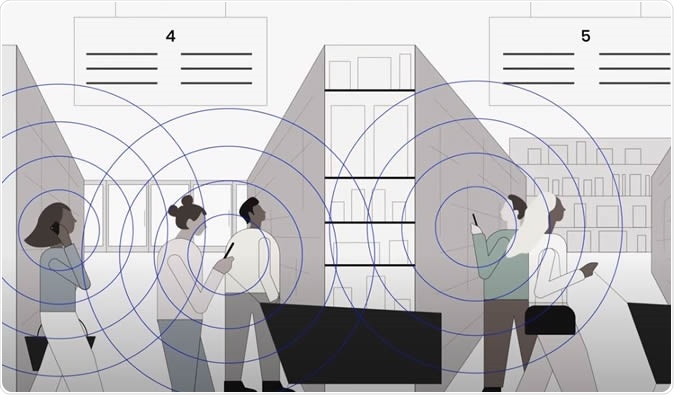As the novel coronavirus pandemic sweeps the globe, contact tracing has taken the spotlight as epidemiologists scramble to identify and isolate potential vectors for the disease. Limited technology has forced authorities to fall back on manual methods, which are both time-consuming and limited in reliability since they depend on the ability of the infected individual to remember all the places and persons he/she has been in contact with. However, more rigorous tracing methods such as location tracking via GPS is frowned upon as a controversial breach of privacy.
Researchers from MIT and other institutions have stepped in to fill this gap by developing a network that allows public health authorities to identify contacts of a positive COVID-19 patient while keeping the data private. The system relies on digital "chirps," which are short-range Bluetooth signals represented by long strings of random numbers. The strings continuously change so that they cannot be traced back to a single individual.

Smartphone-Assisted, Privacy-Preserving COVID-19 Contact Tracing. Image Credit: MIT Lincoln Laboratory
Bluetooth tracking has been around for a while, allowing smartphones to broadcast their presence. Apple's "Find My Phone" system works on the same principle, where lost devices send out chirps, which are picked up by other Apple devices around and then sent on to Apple, which then decodes its location.
When a smartphone is enabled with this app, it sends out such random chirps regularly and also logs its own signals. It logs signals from other phones only if the other phone is within a six-foot radius and has been nearby for a significant length of time.
Interoperability, or the ability of iPhones to pick up signals from Android phones and vice versa, was one of the toughest challenges in developing the new system. It was overcome last week by a group of technicians. MIT's initiative to tackle COVID-19 while maintaining privacy, SafePaths, did early research on automated private contact tracing. The feasibility of the Bluetooth tracker system is built on this work.
Smartphone-Assisted, Privacy-Preserving COVID-19 Contact Tracing
Ron Rivest, MIT Institute Professor and principal investigator of the project, says that the strength of the project lies in its ability to use "cryptographic techniques to generate random, rotating numbers that are not just anonymous, but pseudonymous, constantly changing their 'ID,' and that can't be traced back to an individual."
If a person tests positive for COVID-19 later on, he/she can download the app and use it to scan a QR code received from the health service. This allows the infected person to upload the logged chirps to the cloud. These logs can then be scanned by anyone else with the same app. If chirps match, a notification will be issued to inform the user how long and how close an infected person was in proximity over the last two weeks.
The notification will also advise them on the next step to take, depending on the area public health protocol. This could be anything from self-isolation to COVID-19 testing. "What's also great is that the technology can be flexible to how public health officials want to manage contacts with exposed cases in their specific region, which may change over time." says medical advisory team leader Dr. Louise Ivers.
The use of chirps to log contact between devices ensures that even random strangers can be traced, while their personal information is protected.
If most people with a smartphone and an enabled app did a daily scan, they could tell if they had been in contact with an infected person, without knowing who it was. Large-scale contact tracing using this system has twin benefits - it allows authorities to accurately identify exposed individuals and avoid unnecessary quarantine while ensuring that people can begin to go about their business once the pandemic shows signs of receding. "We want to be able to let people carefully get back to normal life while also having this ability to quarantine and identify certain vectors of an outbreak carefully," Rivest says.
The team has moved forward with prototyping and permissions, meeting with giants such as Apple, Microsoft, and Google, as well as state and federal agencies to begin implementation of the tracking system. The Massachusetts General Hospital Center for Global Health, CSAIL, MIT Lincoln Laboratory, Boston University, Brown University, MIT Media Lab, The Weizmann Institute of Science, and SRI International are some of the collaborators who have worked to develop the public health project. Rivest and his team also look forward to working in a central role with other efforts around the country and in Europe to develop similar privacy-first contact tracing systems.
Rivest concludes, "We need a large percentage of the population to opt-in for this system to really work. We care about every single Bluetooth device out there; it's critical to make this a whole ecosystem. This project is a collective effort on the part of many, many people to get a system working."